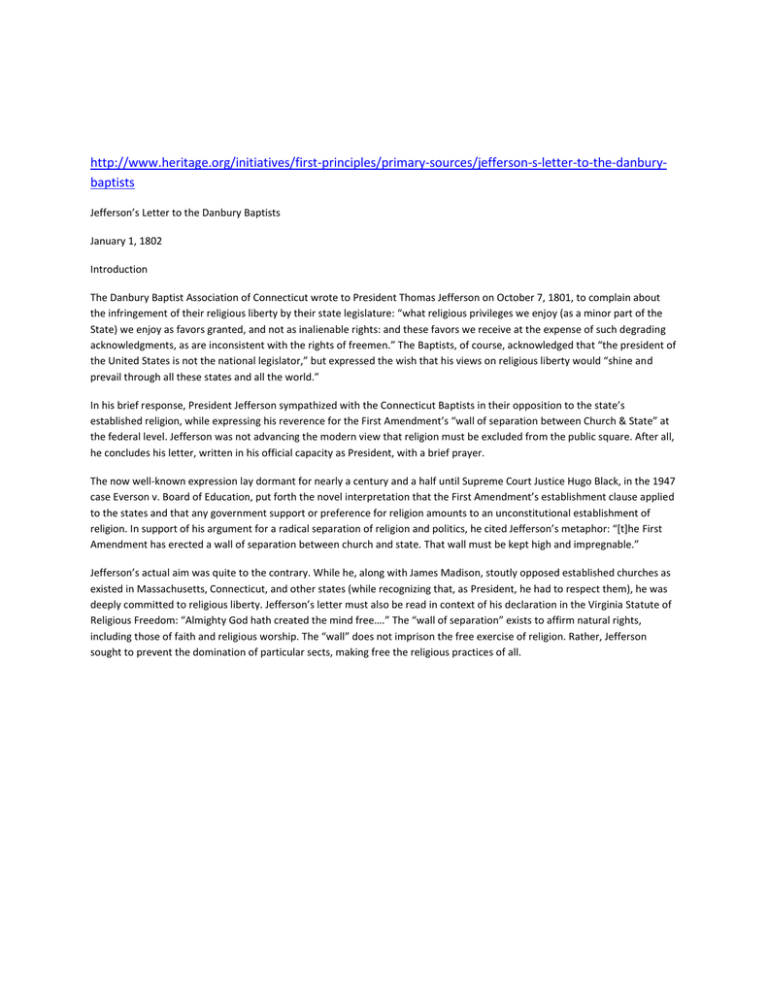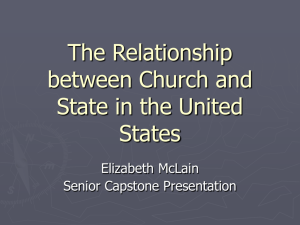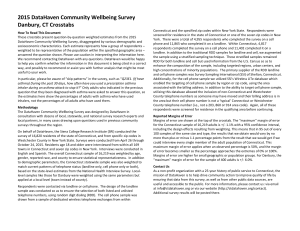First Amendment
advertisement

http://www.heritage.org/initiatives/first-principles/primary-sources/jefferson-s-letter-to-the-danburybaptists Jefferson’s Letter to the Danbury Baptists January 1, 1802 Introduction The Danbury Baptist Association of Connecticut wrote to President Thomas Jefferson on October 7, 1801, to complain about the infringement of their religious liberty by their state legislature: “what religious privileges we enjoy (as a minor part of the State) we enjoy as favors granted, and not as inalienable rights: and these favors we receive at the expense of such degrading acknowledgments, as are inconsistent with the rights of freemen.” The Baptists, of course, acknowledged that “the president of the United States is not the national legislator,” but expressed the wish that his views on religious liberty would “shine and prevail through all these states and all the world.” In his brief response, President Jefferson sympathized with the Connecticut Baptists in their opposition to the state’s established religion, while expressing his reverence for the First Amendment’s “wall of separation between Church & State” at the federal level. Jefferson was not advancing the modern view that religion must be excluded from the public square. After all, he concludes his letter, written in his official capacity as President, with a brief prayer. The now well-known expression lay dormant for nearly a century and a half until Supreme Court Justice Hugo Black, in the 1947 case Everson v. Board of Education, put forth the novel interpretation that the First Amendment’s establishment clause applied to the states and that any government support or preference for religion amounts to an unconstitutional establishment of religion. In support of his argument for a radical separation of religion and politics, he cited Jefferson’s metaphor: “[t]he First Amendment has erected a wall of separation between church and state. That wall must be kept high and impregnable.” Jefferson’s actual aim was quite to the contrary. While he, along with James Madison, stoutly opposed established churches as existed in Massachusetts, Connecticut, and other states (while recognizing that, as President, he had to respect them), he was deeply committed to religious liberty. Jefferson’s letter must also be read in context of his declaration in the Virginia Statute of Religious Freedom: “Almighty God hath created the mind free….” The “wall of separation” exists to affirm natural rights, including those of faith and religious worship. The “wall” does not imprison the free exercise of religion. Rather, Jefferson sought to prevent the domination of particular sects, making free the religious practices of all. Letter to the Danbury Baptists January 1, 1802 To messers. Nehemiah Dodge, Ephraim Robbins, & Stephen S. Nelson, a committee of the Danbury Baptist association in the state of Connecticut. Gentlemen The affectionate sentiments of esteem and approbation which you are so good as to express towards me, on behalf of the Danbury Baptist association, give me the highest satisfaction. my duties dictate a faithful and zealous pursuit of the interests of my constituents, & in proportion as they are persuaded of my fidelity to those duties, the discharge of them becomes more and more pleasing. Believing with you that religion is a matter which lies solely between Man & his God, that he owes account to none other for his faith or his worship, that the legitimate powers of government reach actions only, & not opinions, I contemplate with sovereign reverence that act of the whole American people which declared that their legislature should “make no law respecting an establishment of religion, or prohibiting the free exercise thereof,” thus building a wall of separation between Church & State. Adhering to this expression of the supreme will of the nation in behalf of the rights of conscience, I shall see with sincere satisfaction the progress of those sentiments which tend to restore to man all his natural rights, convinced he has no natural right in opposition to his social duties. I reciprocate your kind prayers for the protection & blessing of the common father and creator of man, and tender you for yourselves & your religious association, assurances of my high respect & esteem. Th. Jefferson https://www.au.org/files/images/page_photos/jeffersons-letter-to-the.pdf http://www.voanews.com/content/missouri-student-protesters-deny-media-access-stir-firstamendment-questions/3052050.html https://provost.uchicago.edu/FOECommitteeReport.pdf







